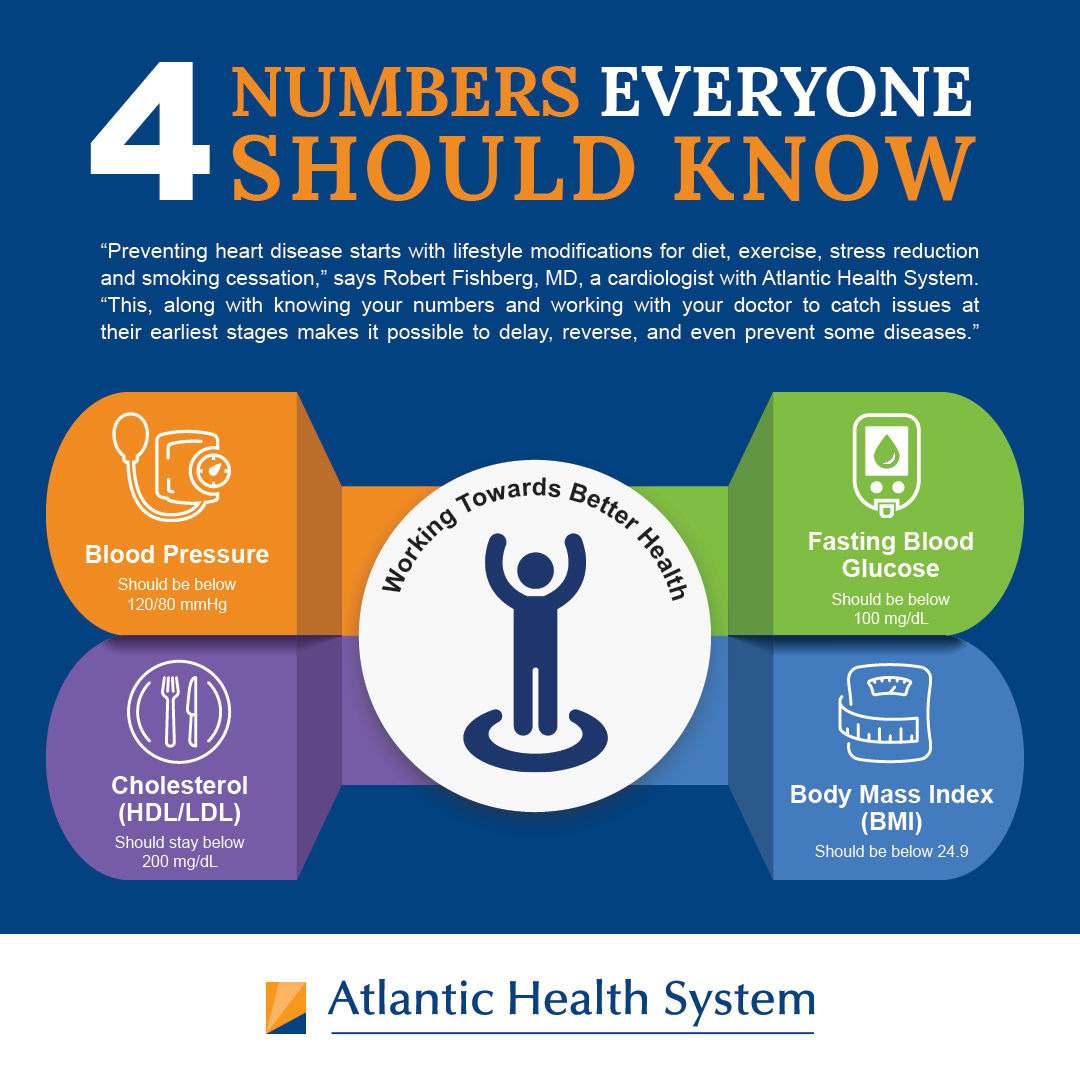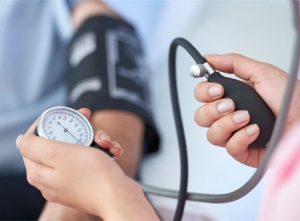If you’re looking to take steps towards better health, knowing your numbers is a great place to start. Four simple readings can paint a solid picture of your health — and reflect early signs of illness before any symptoms surface. Here are the numbers that you and your doctor should monitor.
- Blood pressure
- Blood cholesterol (HDL/LDL)
- Fasting blood glucose
- Body mass index (BMI/weight)
“Preventing heart disease starts with lifestyle modifications for diet, exercise, stress reduction and smoking cessation,” says Robert Fishberg, MD, a cardiologist with Atlantic Health System. “This, along with knowing your numbers and working with your doctor to catch issues at their earliest stages makes it possible to delay, reverse, and even prevent some diseases.”
Know Your Numbers and Your Risk Level
1. Blood Pressure
A blood pressure reading has two numbers: the top number measures the pressure in your arteries when your heart beats (systolic), the bottom number measures the pressure in your arteries when your heart rests between beats (diastolic). Healthy blood pressure should be below 120/80 mmHg.
Higher numbers should be monitored regularly because that means your heart is working extra hard. Over time, high blood pressure can cause the heart to enlarge or weaken, and can lead to heart failure, heart attack or stroke.
2. Cholesterol (HDL/LDL)
Cholesterol is a fat-like substance in your blood. Healthy blood cholesterol should stay below 200 mg/dL — with good cholesterol (HDL) above 60 mg/d and bad cholesterol (LDL) below 100 mg/dL. Triglycerides are also a type of fat in your body and should remain under 150 mg/dL.
3. Fasting Blood Glucose
Extra sugar in your blood can harm organs and damages nerves and blood vessels. Healthy blood sugar should be below 100 mg/dL. Anything higher can indicate prediabetes, with 125 mg/DL hitting the diabetic range. A1C measures your blood sugar levels over three months and should be below 5.7%.
4. Body Mass Index (BMI/Weight)
BMI is a height-to-weight ratio that calculates excess body fat. A healthy BMI should be below 24.9. A BMI over 30 is dangerous to your health and can increase your risk for high blood pressure, heart disease, type 2 diabetes, and sleep apnea.
Working Towards Better Health
“Everyone should get baseline measurements starting at age 20,” says Dr. Fishberg. “We will help you understand your health risk based on family history, lifestyle, and your four key numbers. With this information, we’ll work together on a health plan that helps you live your best life and avoid serious health issues down the road.”

Be Proactive About Heart Health
Stay up to date with your annual visits to prevent and detect more serious issues and learn about risk factors for heart disease.
Related Articles
Five Reasons to Connect With Your Primary Care Doctor
Keeping up with your heart health begins with your primary care doctor. Discover how staying up to date with your annual visits can keep you well -- and prevent or detect serious medical issues at their earliest stages.
The Importance of Knowing Your Blood Pressure
Your blood pressure numbers are key markers for heart health and can tell you more than you think. Learn what these numbers mean, what factors contribute to a healthy blood pressure and what medical problems can arise when left unchecked.
5 Things Raising Your Risk for Heart Disease
Genetics play a role in your risk for heart disease, but it’s not the only factor. Learn the top 5 things raising your risk for developing heart disease.
Patient Success Story: Joe P.
Joe’s AFib made him a candidate for the AdmIRE clinical trial. Learn why he said “yes” to participating and how electrophysiologist Jonathan Sussman, MD, healed Joe’s heart.




